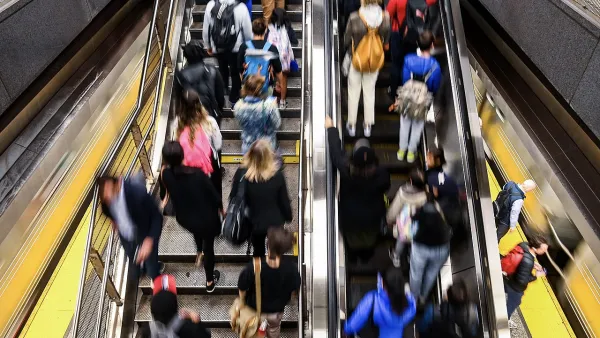Public transit systems in major U.S. cities are starting to focus on non-rush hour travelers as pre-pandemic commuting patterns shift and transportation needs change.

“The new normal for big-city transit agencies is the off-peak rider,” asserts Alissa Walker in Curbed. “The same numbers of people aren’t flooding into central business districts every weekday, but ridership for many agencies has surged on afternoons and weekends.”
Walker continues, “Existing MTA schedules specifically fail workers who have shift or service jobs that don’t follow nine-to-five commuting patterns, according to the ‘Round the Clock is the New Rush Hour’ report by the City Comptroller’s Office.”
These off-peak riders are the people the MTA had in mind when it announced a four-phase plan to increase off-peak service by 2024. The service expansion will start in July with weekend enhancements on three lines — G, J, M — selected because their ridership trends are already demonstrating faster recovery compared to elsewhere on the system.
On the question of whether improving off-peak service would help the agency’s struggling bottom line, Walker writes, “Transit expenditure expert Alon Levy estimates increasing MTA service to six minutes or less systemwide could increase ridership by 15 percent,” though that may not directly translate into higher revenue.
Making New York City transit faster, better, and safer is necessary but not sufficient for bringing back ridership and pulling the MTA back from its fiscal cliff. Walker notes that Gov. Hochul’s state budget also includes a new payroll tax slated to bring over $1 billion in new annual funding for the MTA, and $35 million dedicated to improving off-peak service.
FULL STORY: The Off-Peak Rider Is the Future of the Subway

Planetizen Federal Action Tracker
A weekly monitor of how Trump’s orders and actions are impacting planners and planning in America.

Chicago’s Ghost Rails
Just beneath the surface of the modern city lie the remnants of its expansive early 20th-century streetcar system.

Amtrak Cutting Jobs, Funding to High-Speed Rail
The agency plans to cut 10 percent of its workforce and has confirmed it will not fund new high-speed rail projects.

Ohio Forces Data Centers to Prepay for Power
Utilities are calling on states to hold data center operators responsible for new energy demands to prevent leaving consumers on the hook for their bills.

MARTA CEO Steps Down Amid Citizenship Concerns
MARTA’s board announced Thursday that its chief, who is from Canada, is resigning due to questions about his immigration status.

Silicon Valley ‘Bike Superhighway’ Awarded $14M State Grant
A Caltrans grant brings the 10-mile Central Bikeway project connecting Santa Clara and East San Jose closer to fruition.
Urban Design for Planners 1: Software Tools
This six-course series explores essential urban design concepts using open source software and equips planners with the tools they need to participate fully in the urban design process.
Planning for Universal Design
Learn the tools for implementing Universal Design in planning regulations.
Caltrans
City of Fort Worth
Mpact (founded as Rail~Volution)
City of Camden Redevelopment Agency
City of Astoria
City of Portland
City of Laramie





























